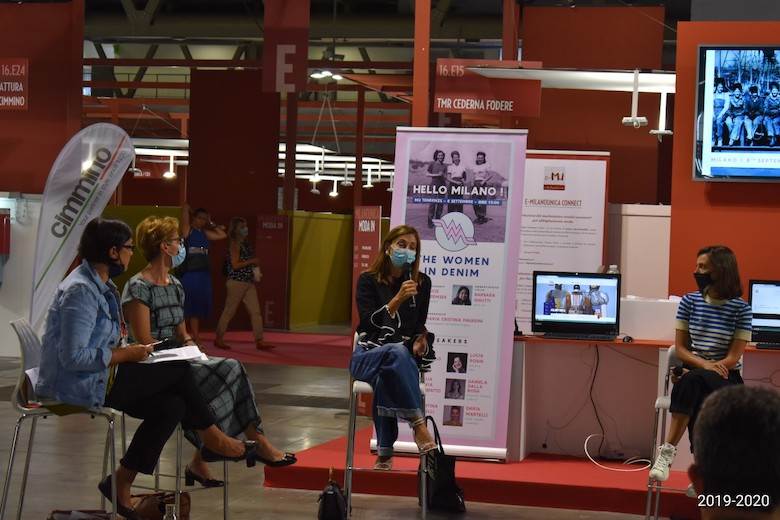Women In Denim hosts roundtable at Milano Unica

The Women In Denim network, which aims to empower women in the denim industry, hosted a roundtable discussion at the Milano Unica exhibition in Milan on September 8.
At the event, nine women spoke about their life and work experiences, inside and outside the fashion industry, reflecting on the role that dialogue and speaking out can play in “re-shaping the system”.
Women In Denim founder, Lucie Germser, and the network’s representative in Italy, Barbara Gnutti, opened the roundtable, explaining the objectives of Women In Denim and presented information on the wider situation of women in the workplace.
Ms Germser addressed the question of the gender pay gap, pointing out that, on average, women earn 24% less than similarly qualified male colleagues. She also said that only 16% of the sport broadcast on television involves women athletes, while women have a 72% share of the work involved in running a home.
Specific to the fashion sector, Lucie Germser said that women represent 80% of the workforce in garment production. Nevertheless, she said there is a top-15 fast fashion company, according to the Fortune 500 list, that has no women at all on its board.
Other speakers included Alice Tonello, who is responsible for marketing and research and development at garment finishing technology provider, Tonello. She spoke about her experience of working her way up to her current position over a number of years by carrying out a variety of roles at the company. Now, as a working mother, she said she still receives criticism for leaving her family home to go on work trips. She pointed out that men do this all the time but that she, as a woman, had had to work hard to create a work-life balance.
She said she had succeeded in building up strong relationships with supply chain partners, including in countries that she described as still less than accepting of women in management roles. But she said she sometimes wondered if it would have been as easy for her to do this if Tonello were not her family’s company. She added that the attitudes of new generations, and their use of social media, were making it easier for people from different cultures to connect.
In her contribution to the roundtable, the head of design for men’s products at Pepe Jeans London, Daria Martelli, said she viewed education and “cultural training” as fundamental in breaking down structures that “make it impossible for women to take up leadership roles inside companies”.
Later, the chief operating officer at hangtag and label manufacturer Cadica, Martina Caselli, made a reference to the Me Too movement. She said she was sure that, in recent years, “thanks also to the Weinstein case”, there had been increased attention and sensitivity towards the work situation of women across the world. “The principal thing about this,” she said, “is that understanding has grown among women themselves about their own situation. Women now are no longer willing just to accept certain situations but are deciding to fight back, to speak up and to try to change what’s not right.”
Lucia Rosin, founder of Veneto-based brand consultancy Meidea, brought up a concrete case from an important denim-producing country, Turkey. Turkey is a signatory to the Council of Europe Convention on preventing and combating violence against women and domestic violence, better known as the Istanbul Convention, but Ms Rosin said the Turkish government wants to withdraw from the treaty.
She added that, because the denim industry is in the fortunate position of having “strong, women who are passionate about their work” in key positions. “We should support women in Turkey over this,” she said.
Founder of Daisy, a consultancy that works with clothing brands to help them lower their environmental impact, Dalia Benefatto, also took part in the roundtable. She said she hoped schools would soon begin to focus on encouraging children’s self-esteem and personal growth. She said this would lead in the future to genuine equal opportunities.
A Milan-based lawyer, Daniela Dalla Rosa, who has worked as legal counsel for clothing brands, including Gucci and Levi Strauss, spoke on the same subject. She said equal opportunities for women can be constructed in the world of work and argued that all professional women should do what they can to bring this about, even if only by offering solidarity and closeness. Individuals can do this and so can companies, she said, adding: “There is still a long way to go.”
Image: Matteo Bordignon










